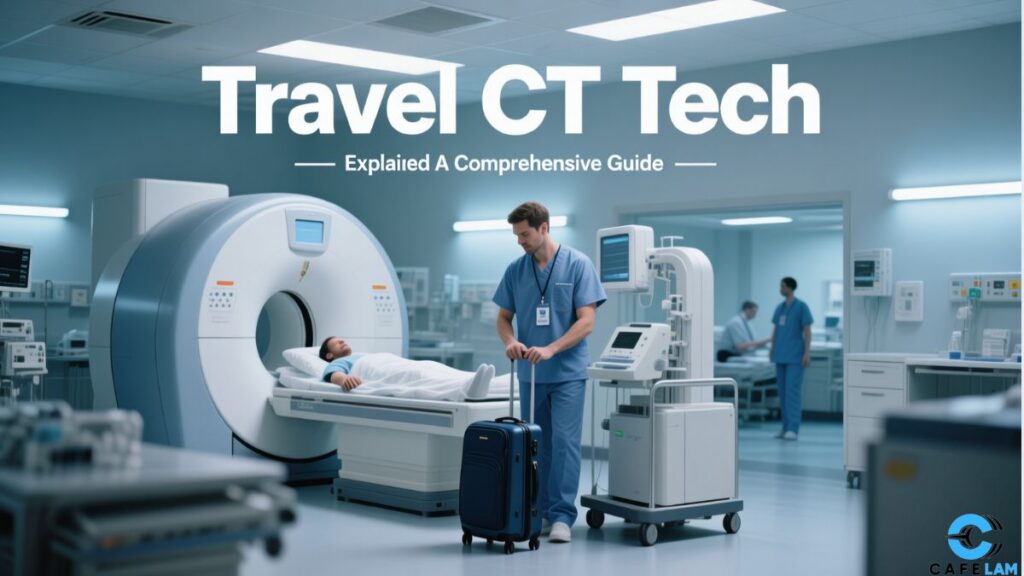In today’s fast-evolving healthcare system, the demand for skilled medical professionals continues to rise. One such vital role that has gained significant attention in recent years is that of the travel CT tech. But what exactly is a travel CT tech? Simply put, a travel CT tech—short for Computed Tomography Technologist—is a certified radiologic professional who specializes in operating CT scanning equipment and travels to different healthcare facilities on a temporary basis to fill staffing needs. These professionals play a crucial role in ensuring that hospitals, clinics, and diagnostic centers can continue to provide high-quality imaging services, even during staffing shortages or peak patient loads.
The term “travel” in travel CT tech refers to the nature of their employment. Unlike traditional radiologic technologists who work full-time at a single facility, travel CT techs accept short-term contracts—typically lasting 8 to 13 weeks—at various medical institutions across the country. These assignments can be in urban hospitals, rural clinics, or even mobile imaging units. The flexibility of this career path allows professionals to explore different regions, gain diverse clinical experience, and often enjoy higher pay and better benefits than their permanently placed counterparts.
So, what is a travel CT tech beyond just a job title? It’s a dynamic and rewarding career that combines medical expertise with adventure. These technologists are responsible for preparing patients for CT scans, positioning them correctly, operating advanced imaging machines, and ensuring that the resulting images are clear and accurate for diagnosis. They work closely with radiologists, nurses, and other healthcare providers to support timely and effective patient care.
To become a travel CT tech, individuals must first complete formal education in radiologic technology, typically earning an associate or bachelor’s degree from an accredited program. After graduation, they must pass the American Registry of Radiologic Technologists (ARRT) certification exam to become a Registered Radiologic Technologist (RT). Many employers also require additional certification in computed tomography, which involves specialized training in CT procedures, radiation safety, and cross-sectional anatomy. Once certified, technologists can begin applying for travel positions through staffing agencies that specialize in healthcare placements.
Why Are Travel CT Techs in High Demand?
The increasing need for travel CT techs is driven by several factors within the healthcare industry. One of the primary reasons is the ongoing shortage of skilled imaging professionals. As the population ages and the prevalence of chronic diseases rises, the demand for diagnostic imaging—such as CT scans for detecting tumors, internal injuries, and cardiovascular conditions—has surged. Many hospitals and clinics struggle to maintain full-time staffing levels, especially in remote or underserved areas.
Another reason for the high demand is the seasonal fluctuation in patient volume. For example, during flu season or after holidays, emergency departments often see a spike in trauma cases, requiring more imaging services. Travel CT techs step in to provide temporary support, ensuring that patients receive timely diagnoses without long wait times. Additionally, when a permanent staff member goes on maternity leave, takes a sabbatical, or resigns unexpectedly, a travel CT tech can quickly fill the gap, maintaining operational continuity.
Hospitals also benefit from the specialized skills that travel CT techs bring. Many of these professionals have worked in multiple healthcare settings, exposing them to a wide range of equipment, protocols, and patient populations. This experience makes them highly adaptable and efficient, capable of integrating into new teams with minimal training. Their ability to handle high-pressure environments and complex cases makes them invaluable assets during critical periods.
Benefits of Being a Travel CT Tech
Choosing a career as a travel CT tech offers numerous advantages, both professionally and personally. One of the most attractive benefits is the competitive compensation. Travel technologists often earn higher hourly wages than permanent staff, and many assignments include additional perks such as housing stipends, travel reimbursements, health insurance, and retirement plans. Some agencies even offer signing bonuses and completion bonuses for finishing a contract.
Another major benefit is the opportunity for professional growth. By working in different facilities, travel CT techs gain exposure to various imaging technologies, hospital workflows, and clinical practices. They may work with state-of-the-art CT scanners in a major urban hospital one month and then assist in a rural clinic with limited resources the next. This diversity enhances their technical skills, problem-solving abilities, and adaptability—qualities that are highly valued in the healthcare field.
On a personal level, being a travel CT tech allows individuals to explore new cities and cultures. Whether it’s working in a coastal town, a mountain resort, or a bustling metropolitan area, these professionals can combine their career with a sense of adventure. Many find that the flexibility of travel assignments allows them to achieve a better work-life balance, take time off between contracts, or pursue personal interests such as hiking, photography, or volunteering.
ALSO READ THIS POST: Adventus Lignin 360: Sustainable Innovation in Biomaterials
Common Work Settings for Travel CT Techs
Travel CT techs can be found in a variety of healthcare environments, each offering unique experiences and challenges. Below is a list of the most common work settings:
- Hospitals (General and Specialty) – Large medical centers often hire travel CT techs to manage high patient volumes or cover staff shortages in their radiology departments.
- Outpatient Imaging Centers – These facilities focus on non-emergency diagnostic scans and offer a more predictable schedule.
- Rural and Remote Clinics – Many underserved areas lack permanent imaging staff, making travel techs essential for providing access to care.
- Mobile Imaging Units – Some travel CT techs work in vans or trailers equipped with CT scanners, bringing services directly to patients in remote locations.
- Veterans Affairs (VA) Hospitals and Government Facilities – These institutions frequently use travel staff to maintain consistent service levels across multiple locations.
Each setting provides valuable experience and contributes to a well-rounded career in radiologic technology.
Travel CT Tech vs. Permanent CT Tech: A Comparison
To better understand what is a travel CT tech, it helps to compare their role with that of a permanent CT technologist. The table below outlines the key differences:
This comparison highlights the trade-offs between stability and flexibility, helping aspiring technologists decide which path aligns with their goals.
How to Become a Travel CT Tech
If you’re wondering what is a travel CT tech and how to become one, the journey begins with education and certification. Start by enrolling in an accredited radiologic technology program, which typically takes two years for an associate degree or four years for a bachelor’s. Coursework includes anatomy, patient care, radiation physics, and imaging techniques.
After graduation, you must pass the ARRT certification exam to become a Registered Technologist (RT). Next, gain hands-on experience in CT scanning through a hospital job or internship. Most travel agencies require at least one to two years of clinical experience before accepting applicants.
Once certified and experienced, you can apply through healthcare staffing agencies that specialize in travel placements. These agencies help match you with suitable assignments, handle licensing paperwork, and provide support throughout your contract. Popular agencies include American Mobile, Aureus Medical, and Club Staffing.
Before accepting an assignment, make sure to review the contract details, including pay rate, housing options, shift hours, and facility expectations. It’s also important to ensure your state license is valid in the location of your assignment, as each state has its own licensing board.
Challenges Faced by Travel CT Techs
While the career offers many rewards, it’s not without challenges. One of the biggest hurdles is the frequent relocation. Packing up and moving every few months can be stressful, especially for those with families or pets. Adjusting to new teams, hospital protocols, and electronic medical record systems also requires quick learning and adaptability.
Another challenge is the uncertainty between contracts. While many techs enjoy the freedom of taking breaks, others may worry about finding their next assignment. However, with the current high demand for imaging professionals, most travel CT techs experience minimal downtime.
Lastly, some travel techs report feeling isolated, especially when working in remote areas with limited social connections. Building a network of fellow travelers and staying in touch with family can help ease this transition.
The Future of Travel CT Tech Careers
The future looks bright for travel CT techs. With advancements in medical imaging technology and an aging population, the need for diagnostic services will continue to grow. According to the U.S. Bureau of Labor Statistics, employment of radiologic and MRI technologists is projected to grow 6% from 2022 to 2032—faster than the average for all occupations.
Moreover, the rise of telehealth and digital imaging has made it easier for travel professionals to integrate into new facilities. Cloud-based image sharing and remote consultations allow for smoother collaboration between technologists and radiologists, regardless of location.
As healthcare systems become more flexible and open to non-traditional staffing models, the role of the travel CT tech will only become more essential. Whether it’s responding to public health emergencies, supporting rural communities, or filling seasonal gaps, these professionals are a vital part of the modern healthcare ecosystem.
Frequently Asked Questions (FAQs)
1. What is a travel CT tech?
A travel CT tech is a certified imaging professional who works temporary assignments at different healthcare facilities across the country.
2. How long do travel CT tech assignments last?
Most assignments last between 8 to 13 weeks, though some may be shorter or longer depending on facility needs.
3. Do travel CT techs get housing?
Yes, most staffing agencies provide a housing stipend or arrange furnished accommodations for travel techs.
4. Is being a travel CT tech worth it?
Yes, it offers higher pay, travel opportunities, and diverse clinical experience, making it a rewarding career for many.
5. Can new CT techs become travel techs?
Most agencies require 1–2 years of experience before accepting travel candidates, so new grads usually start in permanent roles.






